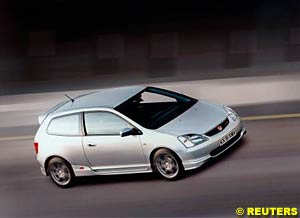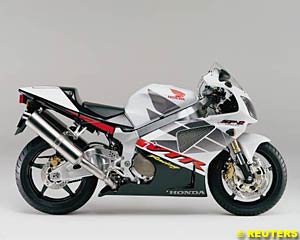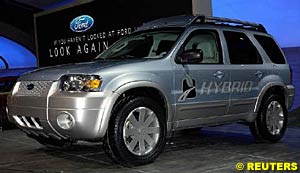

Automotive News and Reviews for the Petrolhead
Reuters Motoring Commentator
In this week's issue:
- From Racetrack to Showroom on a Honda
- Ford Delays Debut of Escape Hybrid
There is an old automotive adage that neatly summarises the value motor manufacturers place on motor sport. "Win on a Sunday, sell on a Monday," quipped Bob Tasca, a legendary American car dealer, who regularly put his theory to the test throughout the sixties, with some success.
For decades car makers have poured money into beating each other on the circuit, and spent a similar fortune advertising the fact when they win. Most consider it money well spent; wouldn't you be inclined to look more closely at a model or brand that regularly trounced its rivals on the track? In reality, it isn't quite that simple, but for many manufacturers, racing is so much a part of their heritage that it becomes irresistible.
Starting From Behind
All very admirable but what does it have to do with racing? Well, first of all, many car companies use (or claim to use) motor sport as the glamorous test and development programme for new technologies and, to a point, this is true. Race-proven experience filters through in many ways, but for Soichiro Honda, the eponymous founder of the Honda Motor Company, racing always came first; he was building and racing cars long before he began manufacturing cheap two-wheeled transport after World War II. As his company grew, so did Soichiro¹s ambition and his race team travelled to the Isle of Man to compete in the world famous TT motorbike meeting. Honda was staggered at how far adrift from the competition his bikes were and the establishment laughed out loud at his team's failure. But it didn't laugh for long.
By 1959, Honda had scored the first of a number of TT victories and a global motorcycle revolution had begun. It has been a similar story in Formula One. Beginning with back-of-the-grid failure in the 1964 German Grand Prix, Honda scored its maiden F1 win in Mexico, just the following year. It has subsequently enjoyed significant success on four wheels, including winning a record 15 out of 16 Grands Prix during the 1988 season.
Honda has long demonstrated a flair for applying this race-proven experience to its road-going product. All too often, the association with racing is primarily a marketing proposition that takes the form of little more than a fetid colour scheme or chrome-finished accessory but at Honda, things go a little deeper. Any Honda that truly symbolises the spirit of its racing division is identified differently, becoming known as Type R.
To date, three such models have been produced and they have all drawn heavily on lessons learned at the track. The latest embodiment of the Type is the Civic, in standard form an accomplished, if less than exhilarating, hatchback model. In R guise, however, it is no overstatement to say that there is nothing else quite like it on the road. It is the most extreme road car I have ever driven, if for no other reasons than its impressive dynamic capabilities are disguised by such an anonymous looking exterior and because it comes at a price (£16,000) that does not normally afford access to such a pure driving experience.
The heart of the matter is Honda's latest generation i-VTEC engine (intelligent variable valve timing, if you were wondering) which provides this car with almost 200bhp. The Civic Type R is all about the engine, both in its own right and because it permits the fullest exploitation of its race-stiff chassis and track-tuned steering. A short-throw, six-speed gearbox completes the sensation of being at the wheel of a bona fide race car. The engine characteristics are such that beyond 6,000rpm, acceleration is nothing short of startling, providing the sort of punch more often associated with a turbocharger. Which is just fine, as this is an i-VTEC Honda and has been designed to scream all the way up to just under 9,000rpm. The key to maximising this Civic's potential is to concentrate on keeping the engine wailing in whichever gear is appropriate, for as long as possible. The rewards are enormous but it isn't easy; for a start, keeping the Type R 'on it' takes considerable application and, more worryingly, is a process that could all too easily see you committing a serious motoring offence. When you're in the mood, however, you just won't want to get out of this Civic; it's the sort of car you invent needless journeys for.
R is for Racing
On the inside, the sense of racing purpose remains. Although the seating position is initially a surprise (it's quite upright and van-like) the relationship between the excellent, suede-feel steering wheel and the dashboard-mounted, brushed aluminium gear lever is perfect. Overall, there is an absence of complication to the interior that is both good and bad. The straightforward placement of a minimal quantity of controls, the generally fuss-free dashboard and an overall feeling of quality emphasise the more performance-orientated spirit of a Type R Honda. To the purist, this is a good thing. For anyone else, the Type R is somewhat less than replete with toys; from launch, air conditioning was a dealer-fit option, for example.
But the evocative R badge is only applied to cars Honda feels do justice to its racing blood-line. The real beauty of this Civic is exactly the thing that makes it so uncompromising; Honda has built a car that prioritises sensory satisfaction over stroking superficial sensibilities.
But then Honda's roots are firmly planted in motorcycles and its range of road bikes, scooters and all terrain vehicles reflects its global position in this market. Once again, it is on the track where the hard work is done. Moto GP, the two-wheeled equivalent of Formula One, is currently dominated by Honda and it has won 42 World Motorcycling Championships and five World Superbike titles since those tentative first steps in the Fifties.
And the link between circuit and showroom is even more direct. The VTR SP2 road bike, for example, a 1000cc, twin-cylinder, fuel-injected Super Sports machine is an exact road-going version of the 2002 race bike that Colin Edwards rode to become World Superbike Champion. The basic design is almost identical to the Honda Racing bike and yet you or I can ride this road going example every day, if either of us has got just over £9,300 burning a hole in our leathers.
Wheely Satisfiying
Having spent a week with an SP2 just recently, I have to confess it's tempting. Aside from the problem of folding my 6ft 4ins frame over a bike that, in essence, was designed around the jockey-like dimensions of Colin Edwards, it is hard to find fault. At low speeds, the SP2 is a doddle, benefiting from a nimbleness and manoeuvrability that belies its phenomenal open-road capabilities. This bike is such a complete package; the handling and steering have so evidently been honed on a track; acceleration is immediate from its 132bhp engine; response similarly instantaneous through the sweet six-speed gearbox. And all of it played out to a vibrant accompanying soundtrack, spat back at the world through a pair of thunderous exhaust pipes.
For any manufacturer, a performance model is a doubled-edged sword. Products such as these never represent volume sales and yet they are essential to the overall range because of their halo-effect on lesser models. As a result, many manufacturers sprinkle 'essence of motorsport' here and there, but at Honda there is rather more to it. Part of the legend of old Bob Tasca stems from a book he wrote about the business of customer satisfaction, entitled You Will Be Satisfied. Indeed you will - with a Type R or SP2, satisfaction is as good as guaranteed.
Ford has delayed the debut of its gasoline-electric hybrid sport utility vehicle by several months, saying it wants more time for testing.
Ford is the second Detroit automaker to delay plans for a high-mileage, high-technology hybrid truck. DaimlerChrysler said last year it was cancelling plans for a hybrid version of its Dodge Durango SUV. Ford's Escape and hybrid pickups from DaimlerChrysler's Chrysler unit and General Motors are now all promised for 2004. Ford had said it would sell an unspecified number of hybrid Escapes to business fleets this year as a test program, and sell them to retail buyers next year.
"External fleet testing would have given us the same information that we're collecting internally," Coletti told Reuters. "It's a more efficient use of our resources to conduct the same testing internally."
Coletti said Ford was still targeting fuel economy of up to 40 miles per gallon in city driving for a front-wheel drive hybrid Escape versus 23 miles per gallon for the regular front-wheel-drive Escape with a four-cylinder engine.
Hybrid vehicles use an electric motor and battery pack to improve the fuel efficiency of a traditional engine. The batteries charge when the vehicle cruises or brakes, and the electric motor eases the load on the engine under acceleration.
Environmentalists have demanded more hybrid vehicles from Detroit's Big Three, but automakers have run into several engineering hurdles. Making the electric motor, batteries and all other pieces of the hybrid system work together requires complicated software. Many hybrids do not save enough fuel over the lifetime of the vehicle to pay for their extra cost. And hybrids' fuel consumption can be dramatically affected by driving habits.
So far, Toyota and Honda are the only automakers offering hybrids. Sales of their three hybrid cars have totalled about 27,000 vehicles through August, or about 0.2 percent of the US market. Toyota has been more enthusiastic about the potential for hybrid vehicles, rolling out an updated version of its Toyota Prius sedan and promising a hybrid version of its Lexus RX 330 SUV next year.
Honda sells a hybrid version of its Civic sedan, but is slowly phasing out its two-seat hybrid Insight and has not said what its next hybrid model will be, although insiders say a hybrid version of the Accord might be in the works.
![]() From Racetrack to Showroom on a Honda
From Racetrack to Showroom on a Honda
 Honda is just such a case in point. To most people, a Honda represents a wise decision. It is a manufacturer with a reputation for building safe, reliable cars and boasts a range that is fit to burst with wise decisions. The new Accord, the clever little Jazz and the HR-V are all very sound cars and Honda is in the vanguard of new technologies, having won the World Solar Challenge more than once and brought a hybrid petrol/electric vehicle to market before most.
Honda is just such a case in point. To most people, a Honda represents a wise decision. It is a manufacturer with a reputation for building safe, reliable cars and boasts a range that is fit to burst with wise decisions. The new Accord, the clever little Jazz and the HR-V are all very sound cars and Honda is in the vanguard of new technologies, having won the World Solar Challenge more than once and brought a hybrid petrol/electric vehicle to market before most.
 Perhaps this kind of approach is easier for Honda, due to its steadfast independence. Unlike most manufacturers, it is unburdened by the cost-cutting complications of merger and acquisition. A Honda is a Honda, not a motorised mongrel with uncertain provenance. In place of automotive inter-breeding, Honda has evolved into a diverse engineering and production company that includes a significant power equipment business (garden equipment, generators etc) and a market-leading marine division. And then there is motorcycles: Honda may only be the third biggest car manufacturer in Japan but by some margin, it is the number one name in bikes, right around the world.
Perhaps this kind of approach is easier for Honda, due to its steadfast independence. Unlike most manufacturers, it is unburdened by the cost-cutting complications of merger and acquisition. A Honda is a Honda, not a motorised mongrel with uncertain provenance. In place of automotive inter-breeding, Honda has evolved into a diverse engineering and production company that includes a significant power equipment business (garden equipment, generators etc) and a market-leading marine division. And then there is motorcycles: Honda may only be the third biggest car manufacturer in Japan but by some margin, it is the number one name in bikes, right around the world.
![]() Ford Delays Debut of Escape Hybrid
Ford Delays Debut of Escape Hybrid
 But Ford spokeswoman Angela Coletti said on Monday the automaker was delaying sales to fleets, and that hybrid Escapes would now go on sale in "late summer" of 2004. Coletti said Ford is already conducting durability and fuel economy tests on some hybrid Escapes.
But Ford spokeswoman Angela Coletti said on Monday the automaker was delaying sales to fleets, and that hybrid Escapes would now go on sale in "late summer" of 2004. Coletti said Ford is already conducting durability and fuel economy tests on some hybrid Escapes.
© 2007 autosport.com . This service is provided under the Atlas F1 terms and conditions.
|
Volume 9, Issue 39
Atlas F1 Exclusive
Giancarlo Fisichella: Through the Visor
Articles
The Enemy Within
Season in the Sun
2003 US GP Preview
2003 US GP Preview
US Facts & Stats
Columns
The Fuel Stop
Rear View Mirror
The F1 Trivia Quiz
Bookworm Critique
On the Road
Elsewhere in Racing
The Weekly Grapevine
> Homepage |